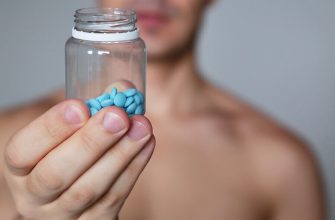Experiencing heartburn while taking Cialis? Try over-the-counter antacids like Tums or Rolaids 30-60 minutes before taking your medication. These can effectively neutralize stomach acid, minimizing discomfort.
If antacids aren’t sufficient, consider histamine-2 blockers (H2 blockers) such as famotidine (Pepcid) or cimetidine (Tagamet). These reduce stomach acid production, offering longer-lasting relief. Always follow the recommended dosage on the packaging.
Proton pump inhibitors (PPIs), like omeprazole (Prilosec) or lansoprazole (Prevacid), provide even stronger acid reduction. However, consult your doctor before using PPIs long-term, as they have potential side effects. Your physician can assess the best approach for your specific situation.
Dietary changes can also help. Avoid trigger foods known to cause heartburn, such as spicy dishes, fatty foods, chocolate, and citrus fruits. Eating smaller, more frequent meals instead of large ones can also significantly reduce symptoms. Remember, staying hydrated is also crucial.
Important Note: This information is for guidance only and doesn’t replace professional medical advice. Always discuss any medication changes, including over-the-counter remedies, with your doctor or pharmacist to ensure they’re safe and appropriate for your health condition.
Cialis and Heartburn: Understanding the Link
Heartburn is a common side effect of Cialis, affecting a significant portion of users. This occurs because Cialis, like many medications, relaxes the lower esophageal sphincter (LES), the muscle preventing stomach acid reflux into the esophagus. A relaxed LES allows stomach acid to flow back up, causing the burning sensation of heartburn.
Medication Interactions
Certain medications, particularly those that also relax the LES or affect stomach acid production, can increase the likelihood of heartburn when taken with Cialis. This includes antacids and proton pump inhibitors (PPIs) which can interact unpredictably. Always consult your doctor before combining Cialis with other medications.
Lifestyle Factors
Lifestyle choices play a role. Eating large meals, particularly fatty or spicy foods, close to bedtime, or consuming alcohol while taking Cialis, increases heartburn risk. Maintaining a healthy weight and quitting smoking can lessen the severity of symptoms. Consider eating smaller, more frequent meals and avoiding trigger foods.
Managing Heartburn with Cialis
If heartburn develops, over-the-counter antacids can provide temporary relief. However, for persistent or severe heartburn, consult a doctor. They can recommend appropriate antacids, PPIs, or other management strategies suitable for your situation. Never self-treat persistent heartburn. Always follow your doctor’s instructions regarding medication.
When to Seek Medical Attention
Seek immediate medical attention if you experience severe or persistent heartburn accompanied by chest pain, shortness of breath, or other concerning symptoms. This could indicate a more serious medical condition. Don’t hesitate to contact your doctor.
Effective Home Remedies for Cialis-Related Heartburn
Try consuming smaller, more frequent meals instead of three large ones. This reduces the amount of acid your stomach produces at any given time.
Elevate your head using extra pillows while sleeping. Gravity helps keep stomach acid down.
Avoid trigger foods like fatty, fried, or spicy dishes. These increase acid reflux.
Chew gum after meals. Increased saliva production neutralizes stomach acid.
Consider over-the-counter antacids. These neutralize stomach acid quickly, providing relief. Follow product instructions carefully.
Ginger may help. Ginger ale or ginger tea can soothe your stomach.
Maintain a healthy weight. Excess weight puts pressure on your stomach, worsening heartburn.
Quit smoking. Smoking irritates the esophagus, increasing heartburn.
Note: These remedies may not work for everyone. If heartburn persists or worsens, consult your doctor.
Disclaimer: This information is not a substitute for professional medical advice. Always consult a doctor before making changes to your diet or medication.




